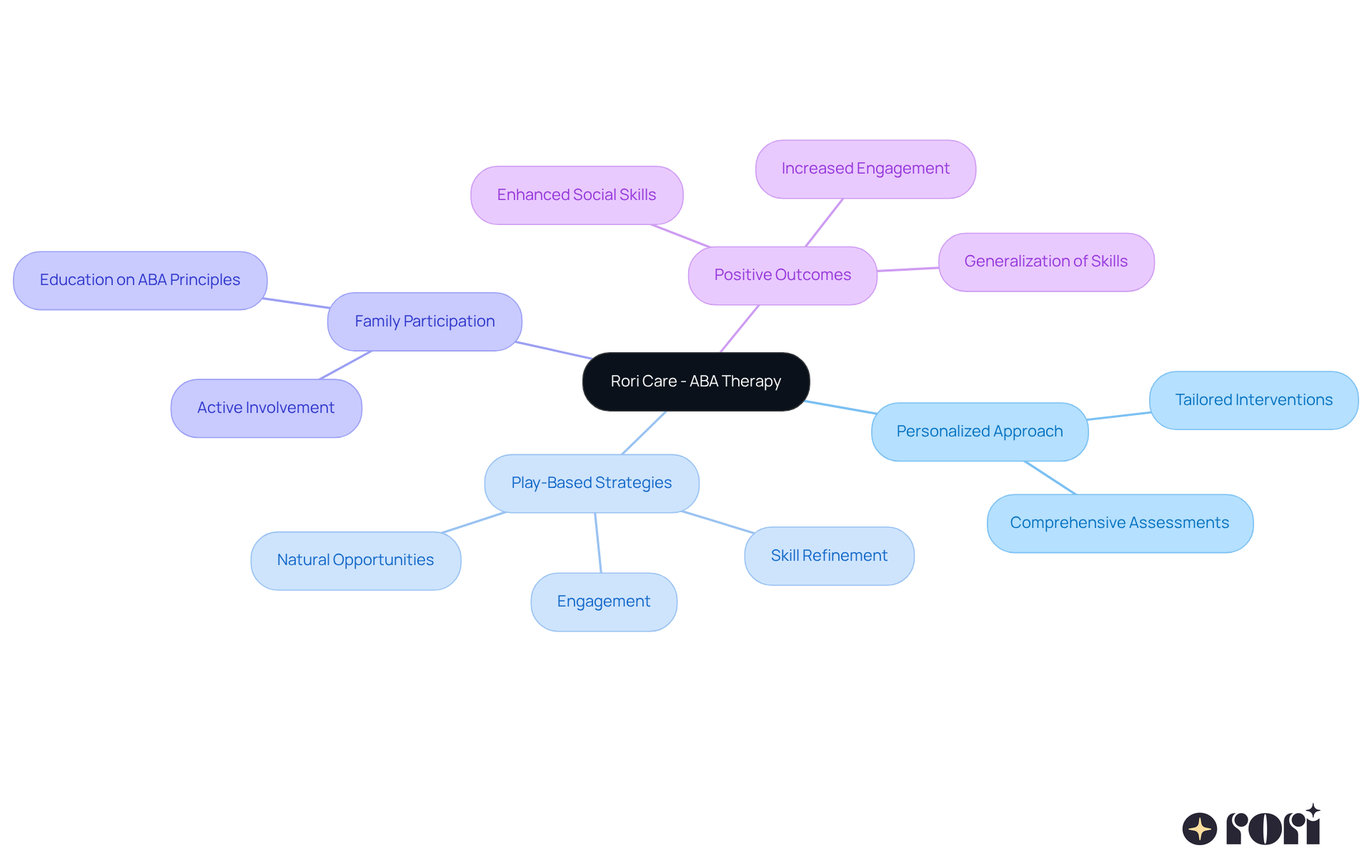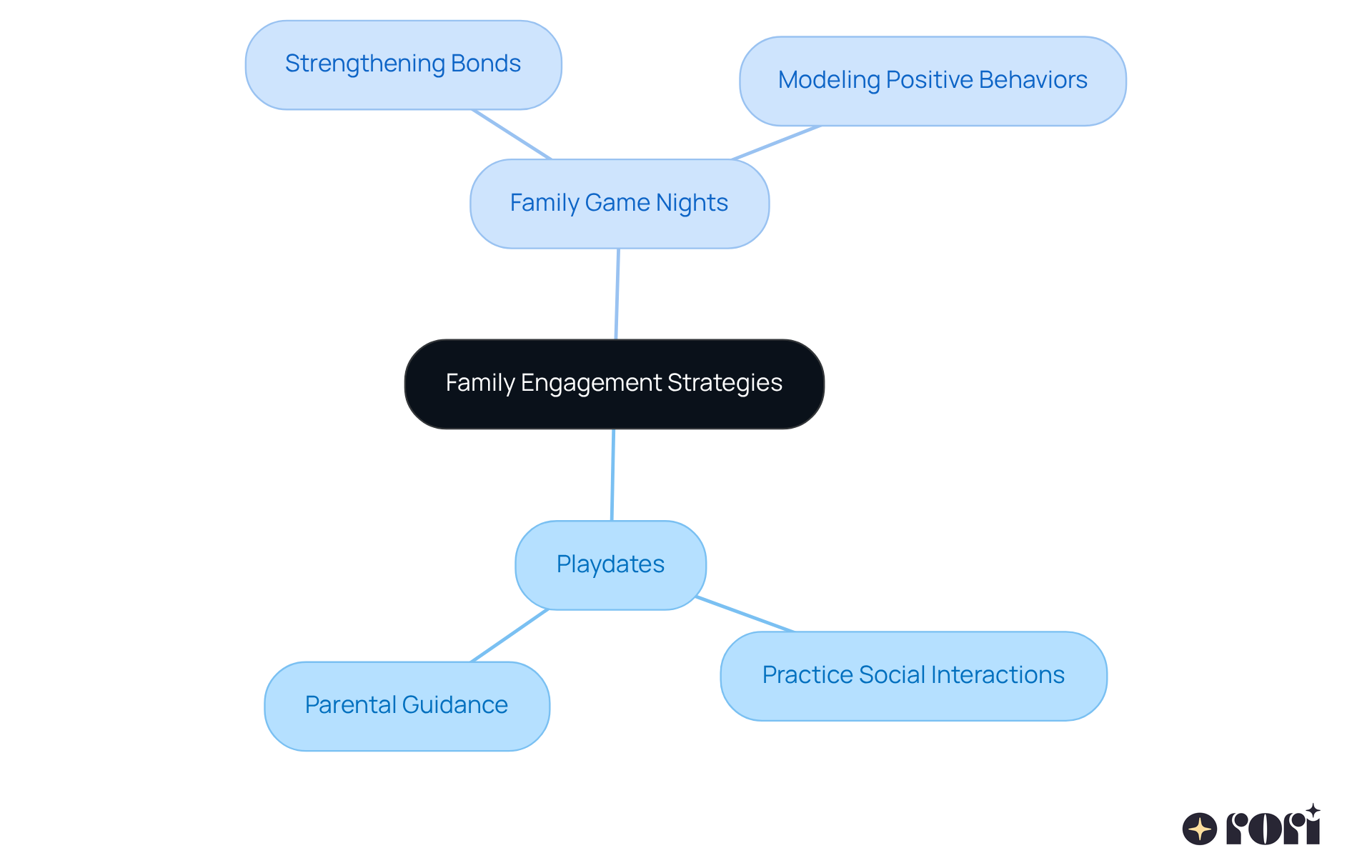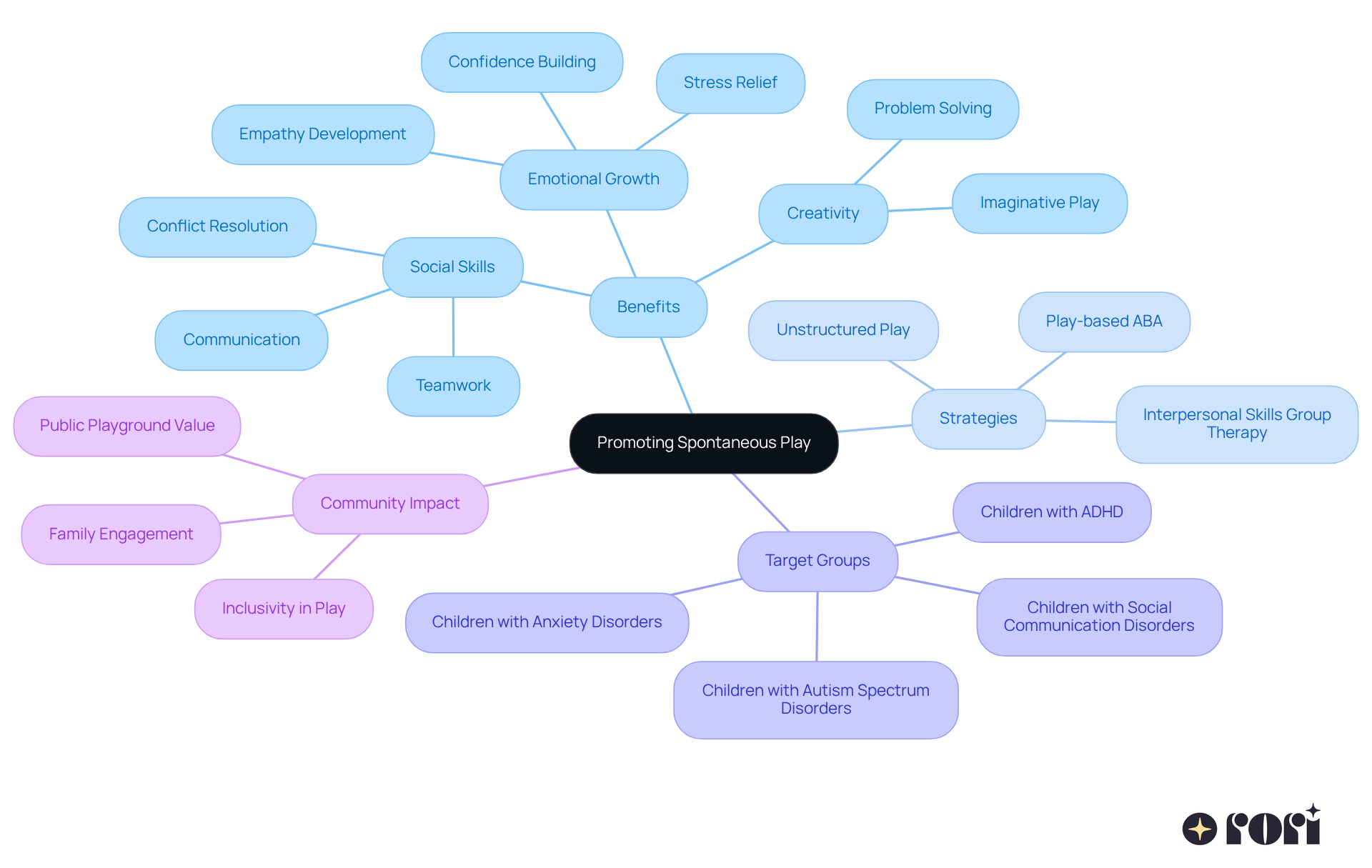Play-based ABA strategies are truly changing the game when it comes to helping kids develop social skills! 🌟 They offer a fun and engaging way for children to learn essential interpersonal skills while enjoying themselves. By tapping into the power of play, these strategies not only make therapy enjoyable but also create natural opportunities for kids to practice and refine their social interactions in a supportive environment.
But you might be wondering, how can you, as a caregiver, weave these techniques into your daily life to really boost your child's progress? 🤔 This article dives into ten innovative play-based approaches that can enhance social skills, providing valuable insights for parents and educators alike. Let’s explore this together!
At Rori Care, we believe in a personalized approach to ABA therapy that truly resonates with each child’s unique needs. Our effective play-based ABA strategies for social skills are designed to be engaging and fun, making therapy feel less like a chore and more like an adventure! 🌟 By conducting thorough evaluations of personal strengths and challenges, our clinicians create tailored interventions that not only enhance interpersonal skills but also spark joy and motivation during sessions.
Research shows that effective play-based ABA strategies for social skills work wonders in enhancing social interactions. They provide natural opportunities for kids to practice and refine their skills in a supportive environment. Clinicians have seen firsthand how effective play-based ABA strategies for social skills lead to greater engagement and better outcomes, reinforcing the idea that learning through play is a powerful tool in ABA therapy.
But it doesn’t stop there! Family participation is key. When caregivers are educated about ABA principles and strategies, they can make informed choices that positively impact their child’s progress. Active involvement not only boosts the effectiveness of therapy but also helps children generalize their skills outside of sessions. This ultimately leads to better behavioral outcomes.
So, let’s explore this together! We’re here to help you every step of the way as you navigate this journey with your child.

Organized play activities, like turn-taking games and role-playing scenarios, are fantastic for kids! They provide clear expectations and chances to practice those all-important interpersonal interactions. These activities utilize effective play-based ABA strategies for social skills, which really help with collaboration, interaction, and problem-solving skills, allowing kids to learn how to navigate social situations in a nurturing environment.
For example, games like 'Simon Says' or board games can teach kids the value of following rules and taking turns. This is especially beneficial for children with Autism Spectrum Disorders, ADHD, Communication Disorders, and Anxiety Disorders, as effective play-based ABA strategies for social skills help boost their confidence. Integrating tools like token boards during these sessions can further motivate kids and reinforce positive behaviors, demonstrating effective play-based ABA strategies for social skills in therapy.
And let’s not forget about group therapy focused on interpersonal skills! It can significantly enhance young people's communication abilities, relationship management, and self-esteem. This approach offers a well-rounded method for personal growth. So, let’s explore this together and see how we can support our kids in their journey!
Using effective play-based ABA strategies for social skills, particularly positive reinforcement during activities, is crucial for helping kids connect with each other! For example, when a child shares a toy or starts a chat, giving them a little verbal encouragement or a small reward can really boost those positive behaviors. It also helps them feel more confident when interacting with their peers.
Research shows that effective play-based ABA strategies for social skills, including a simple compliment, can significantly impact how kids behave socially, encouraging them to be more interactive and collaborative. By consistently recognizing and rewarding these positive moments, caregivers and educators can utilize effective play-based ABA strategies for social skills to create a space where kids feel motivated to engage with others. This not only enhances their social skills but also employs effective play-based ABA strategies for social skills to build stronger connections with their friends.
Let’s explore this together! How have you seen positive reinforcement work in your own experiences with kids?

Naturalistic recreational experiences, like trips to parks or community events, are so important for kids to build their social skills in real-life situations. These settings encourage spontaneous interactions with peers, giving them a chance to apply effective play-based aba strategies for social skills that they’ve learned in therapy. For instance, at a playground, kids can share equipment and negotiate play situations - skills that are crucial for getting along with others.
Did you know that studies show kids with autism often develop social skills more slowly? That’s why these practical experiences are key to bridging therapy and everyday interactions using effective play-based aba strategies for social skills. As one therapist put it, 'Real-life environments offer the best opportunities for young people to practice and enhance their social skills using effective play-based aba strategies for social skills, making learning both meaningful and fun!'
Getting involved in community activities not only boosts interactions with others but also builds confidence, helping kids handle situations more effectively. So, let’s explore this together! How can you encourage your child to engage in these enriching experiences?
Getting families involved in the therapy process is so important for building those interpersonal skills at home! Playdates are a fantastic way for kids to practice their social interactions in a relaxed setting while incorporating effective play-based ABA strategies for social skills. By setting up regular playdates, parents not only give their kids a chance to connect with friends but also get to observe and guide those interactions.
Family game nights can really strengthen bonds and teach teamwork. Plus, when parents model positive social behaviors during these fun times, it sets a great example for the little ones. By joining in on their kids' activities, parents can offer immediate feedback and support, creating a space where those interpersonal skills can really thrive.
As parenting experts often remind us, regular play is one of the effective play-based ABA strategies for social skills that helps kids pick up on social cues and build meaningful relationships. This, in turn, boosts their confidence and independence in social situations. So, let’s explore this together! How can you make playdates a regular part of your family routine?

Data-driven interventions in ABA therapy are crucial for tracking the development of children's social skills through effective play-based ABA strategies for social skills. By gathering information on specific behaviors - like how often a child starts conversations or shares with friends - therapists can really see what’s working and what’s not. Common methods for collecting this data include:
All of which give valuable insights into a child’s progress.
This approach allows for quick adjustments to interventions, ensuring they meet each child’s changing needs. As clinicians often point out, effective data gathering is key; it turns personal observations into measurable results, helping families witness their child’s growth in social interactions. Plus, with the help of advanced AI technology, Rori Care is making ABA therapy even more efficient by automating progress reports. This means therapists can spend 50% more time focused on treatment!
Studies show that hybrid ABA treatment models have led to a 9.7% improvement in achieving goals, highlighting just how effective data-driven strategies can be. This ongoing observation creates a culture of progress, where every data point represents a step forward in a child’s development. Parents can play a big part in this journey by working alongside therapists to understand the information collected and by fostering social skills at home using effective play-based ABA strategies for social skills through organized play and interaction.
Let’s explore this together! Your involvement can make a real difference!

Integrating technology, like interactive apps and virtual reality, into ABA therapy really enhances effective play-based ABA strategies for social skills! These fun tools create engaging environments where kids can build their social skills in a playful way. For example, there are apps designed to mimic social situations, letting children practice conversations and read cues in a safe space. Research shows that these engaging experiences can lead to impressive improvements in social skills - some studies even report up to a 30% boost in relational abilities!
And it doesn’t stop there! Group therapy sessions, guided by skilled therapists, employ effective play-based ABA strategies for social skills to elevate these interactions, helping kids improve their communication and connect better with their peers. Many of these apps come with personalized features that adapt to each child's needs, making the learning experience even more tailored and effective.
By blending technology with group therapy, therapists implement effective play-based ABA strategies for social skills, creating lively learning environments that nurture emotional growth. This way, kids can thrive in real-life interactions! Plus, with AI helping to monitor progress and automate reports, therapists can spend 50% more time on direct treatment, making ABA therapy even more effective.
Let’s explore this together! If you’re curious about how these tools can help your child, we’re here to support you every step of the way!

Recognizing the stages of play development - unoccupied, solitary, onlooker, parallel, associative, and cooperative - can really help clinicians tailor their interventions to fit a young person's current abilities. For example, kids in the associative stage, usually around 3 to 4 years old, thrive in activities that promote collaboration and sharing. Think joint art projects or fun cooperative games!
On the flip side, those in the cooperative stage, generally from ages 4 to 5, can dive into more complex group activities that require negotiation and teamwork, like team sports or role-playing games. Understanding these developmental milestones is super important, especially since individuals with autism might move through these stages at different paces.
Did you know that kids aged 24-30 months often enjoy playing alongside their peers? This insight can be a great way to encourage interactions during therapy. By customizing interventions based on these play stages, we not only boost engagement but also implement effective play-based ABA strategies for social skills, laying a solid foundation for future interactions.
And let’s not forget the vital role caregivers play in these interventions! Their active participation equips them with ABA principles and strategies, leading to better behavioral outcomes and more support for their child's development. Remarkably, when caregivers are fully involved and recommended hours are implemented, about 90% of youths show significant progress.
So, let’s explore this together! Your involvement can make a world of difference!

Encouraging spontaneous activities allows kids to engage in free-flowing interactions that naturally boost their social skills. This program utilizes effective play-based ABA strategies for social skills, making it perfect for children of all ages, especially those who might struggle in social situations, including those with Autism Spectrum Disorders, ADHD, Social Communication Disorders, and Anxiety Disorders. Think about it: activities like playing freely in parks or getting creative with friends create spaces where kids can practice vital communication, teamwork, and conflict resolution skills in a laid-back environment.
When kids take the lead in their play, they explore social dynamics and build friendships in a way that feels organic. Research shows that unstructured playtime is crucial for sparking creativity and honing problem-solving skills, both of which are key for successful interactions. Plus, studies indicate that kids who engage in unstructured play are better equipped to navigate social situations, thanks to effective play-based ABA strategies for social skills, enhancing their ability to form and maintain relationships.
This approach not only nurtures emotional growth but also sets the stage for positive interactions as they grow up. And let’s not forget about interpersonal skills group therapy! It can really amplify these benefits by providing structured opportunities for kids to practice and refine their social skills using effective play-based ABA strategies for social skills in a supportive environment.
As Tom Norquist, former president of IPEMA, wisely said, "Play is the great equalizer." It gives kids the chance to develop empathy and embrace differences. Interestingly, 92% of parents believe that playground activities promote inclusivity among children with varying abilities, highlighting the community benefits of unstructured play.
So, let’s explore this together! How can we create more opportunities for our kids to play freely and connect with others?

Effective play-based ABA strategies for social skills are a wonderful way to help kids with autism develop their social skills! It makes therapy not just effective but also fun and engaging. Through play, children naturally pick up important skills like empathy, teamwork, and communication. This approach not only boosts their motivation but also helps them fall in love with learning, making it easier for them to use these skills in different settings.
Research shows that when kids start early with intensive ABA therapy, particularly using effective play-based ABA strategies for social skills, they see amazing improvements in their communication and social interactions. Isn’t that encouraging? Ultimately, effective play-based ABA strategies for social skills build a solid foundation that helps children navigate their social worlds with confidence and ease.
Let’s explore this together! If you’re a parent looking for ways to support your child, remember that play can be a powerful tool. We’re here to help you every step of the way!

When it comes to helping our kids develop social skills, effective play-based ABA strategies really shine. They focus on engaging children in fun activities that not only make learning enjoyable but also promote growth. By using tailored interventions, these strategies enhance interpersonal skills while creating a joyful atmosphere for therapy. It’s a win-win for both kids and their families!
Throughout this article, we’ve highlighted some key strategies, like structured play activities, positive reinforcement techniques, and naturalistic play experiences. Each of these approaches helps foster social interactions and build essential skills in a supportive environment. Plus, family engagement and data-driven interventions are crucial in reinforcing these strategies, ensuring that children can carry their skills beyond the therapy setting.
Ultimately, integrating play into ABA therapy isn’t just about making learning fun; it’s about transforming how children connect with others and navigate their social worlds. Encouraging spontaneous play and family involvement can really boost a child's confidence and competence in social situations. By embracing these effective play-based strategies, caregivers can empower their children to thrive socially, paving the way for meaningful interactions and relationships in their lives.
So, let’s explore this together! If you’re looking for ways to support your child’s social skills, remember that you’re not alone. We’re here to help you every step of the way!
What is the approach of Rori Care towards ABA therapy?
Rori Care employs a personalized approach to ABA therapy that focuses on each child's unique needs, utilizing effective play-based strategies for social skills that make therapy engaging and enjoyable.
How do play-based ABA strategies enhance social interactions?
Play-based ABA strategies provide natural opportunities for children to practice and refine their social skills in a supportive environment, leading to greater engagement and improved outcomes.
Why is family participation important in ABA therapy?
Family participation is crucial because when caregivers understand ABA principles and strategies, they can make informed decisions that positively impact their child's progress and help them generalize skills outside of therapy sessions.
What types of activities are used to build social skills?
Organized play activities such as turn-taking games and role-playing scenarios are used, which provide clear expectations and opportunities for practicing interpersonal interactions.
Can you give examples of structured play activities?
Examples include games like 'Simon Says' and board games, which teach children the importance of following rules and taking turns, benefiting those with Autism Spectrum Disorders, ADHD, Communication Disorders, and Anxiety Disorders.
How does group therapy contribute to social skills development?
Group therapy focused on interpersonal skills significantly enhances communication abilities, relationship management, and self-esteem among young people, offering a well-rounded method for personal growth.
What role does positive reinforcement play in social interaction?
Positive reinforcement, such as verbal encouragement or small rewards for sharing or initiating conversation, is essential for helping children feel confident and motivated to engage with their peers.
How can caregivers and educators utilize positive reinforcement effectively?
By consistently recognizing and rewarding positive social behaviors, caregivers and educators can create an environment that encourages children to engage more with others, thereby enhancing their social skills.